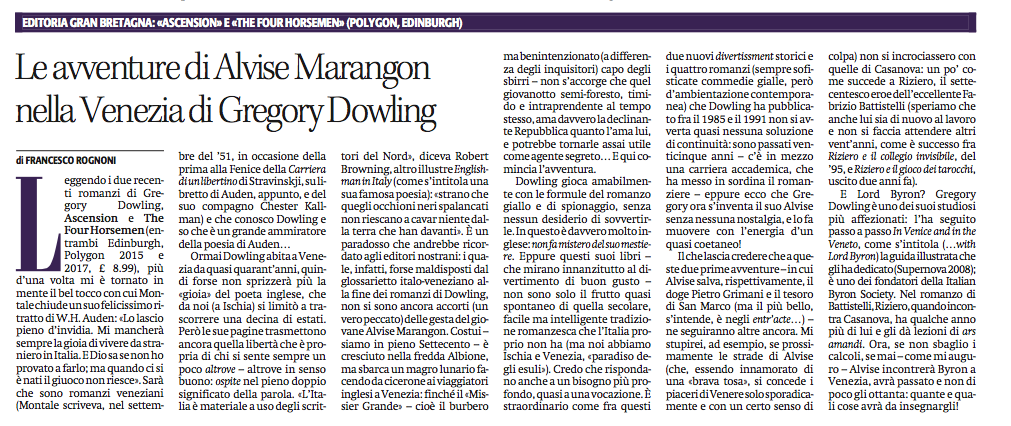Very gratified to have a half-page devoted to the Alvise Marangon mysteries in the cultural insert of Il Manifesto. The article is by Francesco Rognoni (22nd October 2017). Very flattered to find myself in the company of (though not actually compared with) W. H. Auden, Robert Browning and Lord Byron… 
Here’s an English translation:
The Adventures of Alvise Marangon in the Venice of Gregory Dowling
Francesco Rognoni
Alias Domenica, Il Manifesto, 22 October 2017.
Reading the two recent novels by Gregory Dowling, Ascension and The Four Horsemen (both Edinburgh, Polygon 2015 and 2017), more than once I found myself recalling the fine quip with which Montale concluded his great portrait of W.H. Auden: “I leave him full of envy. I will never experience the joy of living as a foreigner in Italy. And God knows but I have tried to do so; but once you’re born there it’s a trick you can never pull off.” It may be because they are Venetian novels (Montale was writing, in September 1951, on the occasion of the premiere of Stravinsky’s opera The Rake’s Progress, with a libretto by Auden and his companion, Chester Kallman) and because I know Dowling and am aware that he is a great admirer of Auden’s poetry…
Dowling has lived in Venice for almost forty years, and so perhaps he is no longer bursting with the “joy” of the English poet, who confined himself to living among us (on Ischia) for a dozen summers. But his pages transmit that sense of freedom that belongs to those who always feel a little bit elsewhere – elsewhere in the good sense: a guest. “Italy is stuff for the use of the North”, said Robert Browning, another famous Englishman in Italy (as in the title of a famous poem of his): “strange that those great wide black eyes should stare nothing out of the earth that lies before them!” This is a paradox that our own publishers need to be reminded of: deterred, perhaps, by the Italo-Venetian glossary that Dowling places at the end of his novels, they seem unaware (a real pity) of the deeds of the young Alvise Marangon. This hero – we are in the middle of the 18th century – grew up in the cold clime of Albion, but now makes a meagre living by acting as cicerone (or guide) to English travellers in Venice: at least until the “Missier Grande” – which is to say, the surly but well-meaning (unlike the Inquisitors) head of the sbirri (or law-enforcers) – realises that this young semi-foreigner, both shy and enterprising, loves the declining Republic of Venice as fervently as he does, and could be useful as a secret agent… And so begins the adventure.
Dowling plays fondly with the formulas of the detective-story and the espionage novel, with no desire to subvert them. In this he is very English: he makes no mystery of his craft. And yet these books – whose aim is essentially high-class entertainment – are not just the almost spontaneous fruit of that centuries-old novel-writing tradition that Italy simply does not possess (but then we have Ischia and Venice, “paradise of exiles”). I believe it answers to a deeper need, almost a vocation. It is extraordinary how these new historical divertissements and the four novels (again sophisticated crime stories, but with contemporary settings) that Dowling published between 1985 and 1994* show no break in continuity: twenty* years have gone by – in the middle of which came an academic career, which put a hold on the activities of the novelist – and yet Gregory has invented his Alvise with no nostalgia, and he makes him move as energetically as if he were the same age as his hero!
All this leads one to believe that these two adventures – in which Alvise saves, respectively, Doge Pietro Grimani and the treasury of St Mark’s (but the best of it all lies in the entr’acte…) – will be followed by yet more. I would be surprised, for example, if in the near future Alvise (who, being in love, with a nice young girl, yields only sporadically to the pleasures of Venus and with a certain sense of guilt) did not cross paths with Casanova: as happens to Riziero, the 18th-century hero of Fabrizio Battistelli’s novels (and we hope that he too is back at work and won’t keep us waiting for another twenty years, as happened between Riziero e il collegio invisibile, 1995, and Riziero e il gioco dei tarocchi, which came out two years ago).
And Lord Byron? Gregory Dowling is one of his keenest scholars: he has followed him step by step In Venice and in the Veneto, as in the title (…with Lord Byron) of the illustrated guide that he devoted to him (Supernova 2008); he is one of the founders of the Italian Byron Society. In Battistelli’s novel, Riziero, when he meets Casanova, is a little older than him and gives him lessons in the ars amandi. Now, unless my calculations are wrong, if Alvise – as I sincerely hope – should meet Byron in Venice, he will be over eighty years old: what great lessons he will be able to teach him!
*Minor correction: the fourth novel, A Nice Steady Job, came out in 1994, not 1991, as indicated in the original article.
